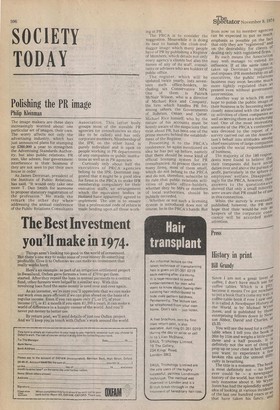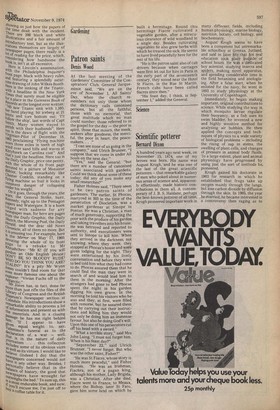History in print
Bill Grundy
Since I am not a great lover of coffee, I don't have much use Mr coffee tables. Which is a PO' because it means I've got nowhere to put a book that's come my waY',, coffee-table book if ever I saw It is called A Newspaper History the World, is by Michael WYtirl Jones, and is Rublished by thos` enterprising fellows down in NeW' ton Abbot, David and Charles, at £5.25.
You will see the need for a coffe,e table when I tell you the book 'a 20in by 11 in and weighs a little over three and a half pounds. It Ls definitely not the sort of thing L" prop up on your chest in bed, unless you want to experience a ° broken ribs and the utmost dihr culty in breathing. The title is a nonsense. The book is most definitely not — no book ever could be — a newspaPer history of the world, but that is the only nonsense about it. Mr WY°,11, Jones has had the splendidly siMP'` idea of looking at various incidents of the last one hundred years or sci° that have taken his fancy, an SPe8tator November 9, 1974 showing us just how the papers of the time dealt with the incident. There are 200 black and white !llustrations and a fair amount of Introductory text, but as the illustrations themselves are largely of newspaper pages, there really is a lot of reading for the price, which, CO
nsidering how handsome the hnok is, isn't at all excessive.
Here is Lincoln's assassination, c'th the Philadelphia Inquirer's 'mot page, black with heavy rules, ar.'d featuring a splendidly saturmile drawing of John Wilkes Booth. Here is the sinking of the Titanic, With a headline in the New York Tlines that surely must be eligible for a place in the Guinness Book of !1ec0rds as the longest ever written: 745 saw Titanic sink with 1,595, her band playing; hit iceberg at 21 !mots and tore bottom out; 'I'll rollow the ship', last words of Capt Sinith. Many women stayed to Perish with their husbands". Here 19,13 is the dawn of flight with the vngirtian-Pilot of December 18, 19°3 proclaiming "Flying machine snars three miles in teeth of high wind over sand hills and waves at kittyhawk on Carolina cost", And that's just the headline. Here too is t".0 Daily Graphic, price one penny, with the whole of its front page de b voted to a picture of Monsieur "16'1Q, looking remarkably like Chester Conklin, standing on a i Ying machine so frail it looks n nnininent danger of collapsing under his weight. h.011 it goes, through the years, the i7ars, the General Strike, Suez, '‘ennedy, right up to the Pentagon liaPars and Watergate. It is a book 'nged with sadness for any fnerwspaper man, for here are pages vi_nitl the Daily Graphic, the Daily 17„eteh, the Morning Post, the Daily ;4`raid, and the dear old News !-hrorticle, all of them no more. But lit's amusing too. For example, here de the Mirror on May 17, 1960, vnting the whole of its front F,,,age to a rebuke to Mr 'Inrushchev: "Mr K! (If you will
don an Olde English phrase)
1‘17 13% SO BLOODY RUDE' 10 DO YOU THINK YOU ARE? • i't ALIN?" It's a pity Mr Wynn 'ones couldn't find room for that .even more famous one about the °tPlorer: "Vivian Fuchs off to the kittarctic." Mr Jones has, in tact, done far inerre than just rifle the files of the liora =y of Congress and the British useum's Newspaper section at olindale. His introductions show a renlarkable ability to process a lot Information and present us with Le essentials. And in a closing sage he has me right behind "If I appear to have Vien equal weight to, say, ,aientino's funeral as to the claration of, a war — „at is in the nature of daily '
rnalism . . this collection L'eludes some of its obvious vices as its virtues. I would like to
nnelieve (indeed I do) that the heWsPapers concerned would not have it any other way. Besides, I '1;,eirsonally believe that in the nZance of history, the good that 0,,`,./ksPapers have wrought far is"...`weighs the bad." To sum up, this if
most endurable book, and now, 0U Ii excuse me, I'm just off to "Y a coffee table for it.



































 Previous page
Previous page